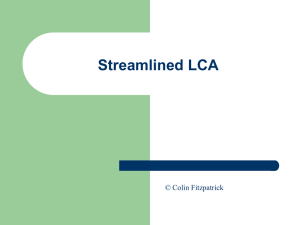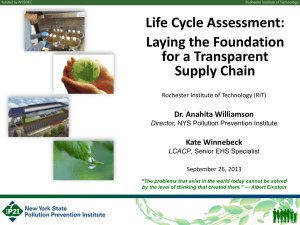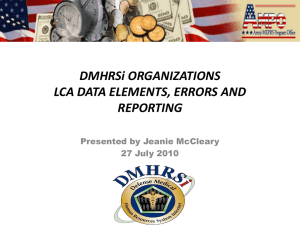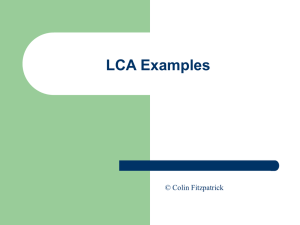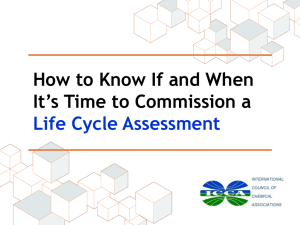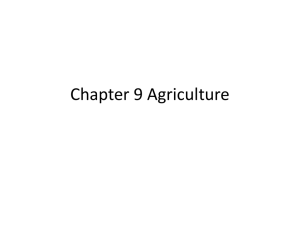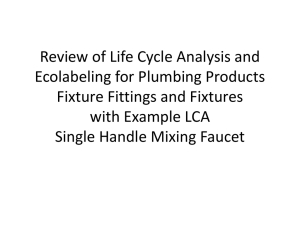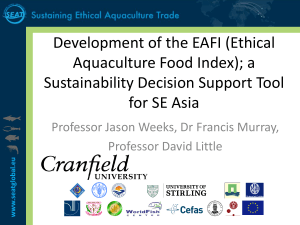LCA Examples & Streamlined LCA
advertisement
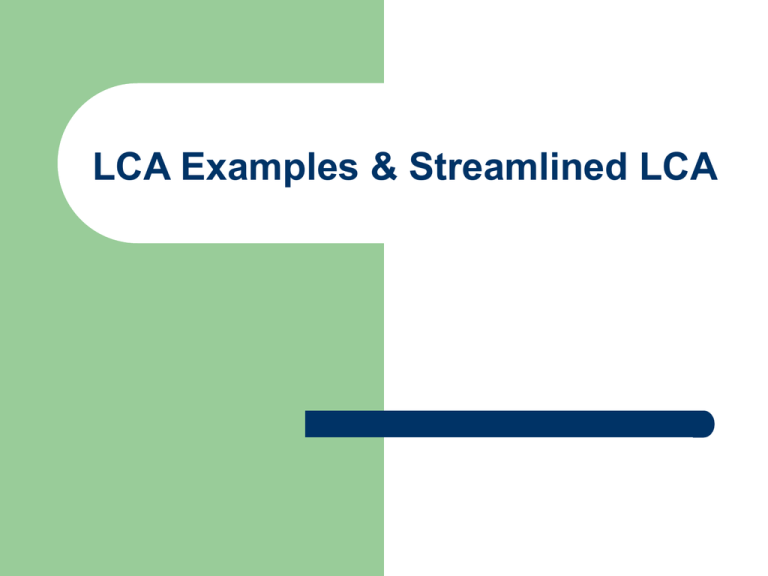
LCA Examples & Streamlined LCA Ericsson LCA Paper “Life Cycle Assessment of 3G Wireless Telecommunication Systems at Ericsson” available in the module network folder. Summary of the study “Life Cycle Assessment of a Third Generation (3G) System at Ericsson” available in the module network folder. Ericsson LCA Goal – – – Develop a flexible LCA model with the capacity of producing reliable environmental information for Ericsson’s present and future needs Develop a user-friendly database with all the LCA data collected during this and previous Ericsson LCA studies Determine and describe the environmental impact from Ericsson’s 3G wireless telecommunication systems Ericsson LCA Scope – – System consists of 3G terminals, radio network, control equipment & a core network with switches, routers, servers and workstations Transmission equipment like feeders and cables & site materials like antennas, climate control equipment and site housing Ericsson LCA Functional Unit – – One year of operation of the 3G pilot system is studied For comparisons another functional unit, per subscriber and information flow and year is needed. Ericsson LCA Following Indicators studied – – – – – – – – – – Climate change Resource depletion Acidification Photochemical ozone generation Aquatic eutrophication Terrestrial eutrophication Ozone depletion Land use Human toxicity Ecosystem toxicity Ericsson LCA Focuses on the climate change indicator as it is the most widely accepted environmental indicator. Based on the global warming potential (GWP) and is measured in CO2 equivalents Two external independent scientists reviewed the LCA to ensure carried out to ISO14040 series specification. Although data is not available to the public, the data used is valid and interpretations are accurate Ericsson LCA Ericsson LCA Ericsson LCA What impact does my 3G subscription have? +0.06% raw material resources depletion +0.7% energy resources depletion & climate change +0.004% use of land resources LCA of an Integrated Circuit Paper available in Network folder EPROM IC chosen for study Gate to Gate study Functional Output is a complete EPROM device Carried out according to relevant ISO standards LCA of an Integrated Circuit Raw Wafer Front End Transport Back End Device LCA of an Integrated Circuit Raw Wafer Oxidation Masking Doping Etching Dielectric Deposition Metallisation Electrical Test Passivation Processed Wafer Front End Processed Wafer Production LCA of an Integrated Circuit Processed Wafer Cut Packaging Electrolytic Tuning Welding Base Bounding Back End Device Realisation Surbase Clipping Insert on Tube Device LCA of an Integrated Circuit Transport – – – – Packaging for transport Truck to airport (40km) Plane from Milan to Singapore (10,000km) Truck to site (10km) LCA of an Integrated Circuit Material Quantity DI Water 29 litres Oxygen 140 mg Nitrogen 122 g Hydrogen 2.9 mg Ceramic 7g PVC 0.4 g HDPE 0.1 g Lead 0.03 mg Copper 1.2 mg Tin 0.15 g Boron Arsenic 2.9 mg 6.9 mg Selected total inventory data for one single EPROM device LCA of an Integrated Circuit Phase Quantity (MJ) Front End 2.39 Transport 2 x 10 -6 Back End Use 10.11 58.35 Total 70.85 Gross energy in different life cycle phases of one single device LCA of an Integrated Circuit Energy Use Phase – – – – – – Specific device requires 0.36 Watts Life estimated at 10 years Equipment obsolescence estimated less than this (5 years) Real operating time approx 33% of equipment life 1MJ of electrical energy requires 3MJ of gross energy Use phase turns out to be 54 MJ LCA of an Integrated Circuit Effect Quantity (g equivalent) Unit Global warming 394 CO2 Ozone Depletion 0.0001 CFC 11 0.39 0.222 H+ PO4 Acidification Nutrient Enrichment Average Environmental Effect related to one EPROM device Streamlining the LCA Process Full LCA is only practical with no limitations to time, expense, data availability etc… In practice consists of many compromises Although very extensive LCA’s have been conducted a complete quantitative LCA has never been accomplished nor is it ever likely to be Design stage is best time to do LCA but very little data available at this point The LCA Continuum Fully Comprehensive LCA Ecoscreening Currently Accessible Region Extensive LCA Streamlined LCA LCA Scoping Streamlining the LCA Process Screen the product with an inviolates list Limit of eliminate life-cycle stages Include only selected environmental impacts Include only selected inventory parameters Limit consideration to major constituents Limit or eliminate impact analysis Use surrogate data Use qualitative rather than quantitative data Eliminate interpretations or recommendations The SLCA Matrix Number of approaches developed adopting a matrix approach in which several life stages are evaluated for their potential impacts on a number of environmentally related concerns Any SLCA process should allow for – – – – – Direct comparisons between rated products Useable and consistent across different assessment teams Encompass all stages of product life cycle Address all relevant environmental concerns Simple enough to permit relatively quick and inexpensive assessments The SLCA Matrix Life Stage Environmental Concern Materials Choice Energy Use Solid Residues Liquid Residues Gaseous Residues Resource Extraction 1,1 1,2 1,3 1,4 1,5 Product Manufacture 2,1 2,2 2,3 2,4 2,5 Product Delivery Product Use Refurb/ Recycle/ Disposal 3,1 4,1 5,1 3,2 4,2 5,2 3,3 4,3 5,3 3,4 4,4 5,4 3,5 4,5 5,5 Developed in 1993 at AT&T The SLCA Matrix Values may be – Binary – Ordinal 1 = problem 0 = no problem 1-10 severity ranking 1-4 severity ranking Assessor is providing a figure of merit to represent the estimated result from a more formal LCA Should be guided by experience, design & manufacturing survey, appropriate checklists & other available info The SLCA Matrix Once an evaluation has been made for each matrix element the overall Environmentally Responsible Product Rating (RERP) is computed as the sum of the matrix element values R ERP i j M i , j Process is qualitative and utilitarian but does provide a numerical end point against which to measure improvement Target Plots The SLCA Matrix Assignment of integer ratings may seem subjective, experiments at AT&T have been performed in which comparative assessments of products are made by several different industrial and environmental engineers. Overall product ratings differ by no more that 15% SLCA Assets More efficient & less costly (days vrs months) Useable at the early stage of design when opportunities for change are greater Evaluate design attributes which are inherently qualitative such as ease of dissassembly SLCA Liabilities Little or no ability to track overall material flows Little ability to compare completely dissimilar approaches to fulfilling a need Little ability to track improvements over time Cumulative Energy Demand as SLCA Ref: Mhuijbregtsm M, Hellweg S, Hensriks "Cumulative Energy Demand As Predictor for the Environmental Burden of Commodity Production" Environ. Sci. Technol., Article ASAP DOI: 10.1021/es902870s CED as SLCA CED as SLCA CED time CED as SLCA T1 Further Reading Graedel & Allenby, Chapter 17
